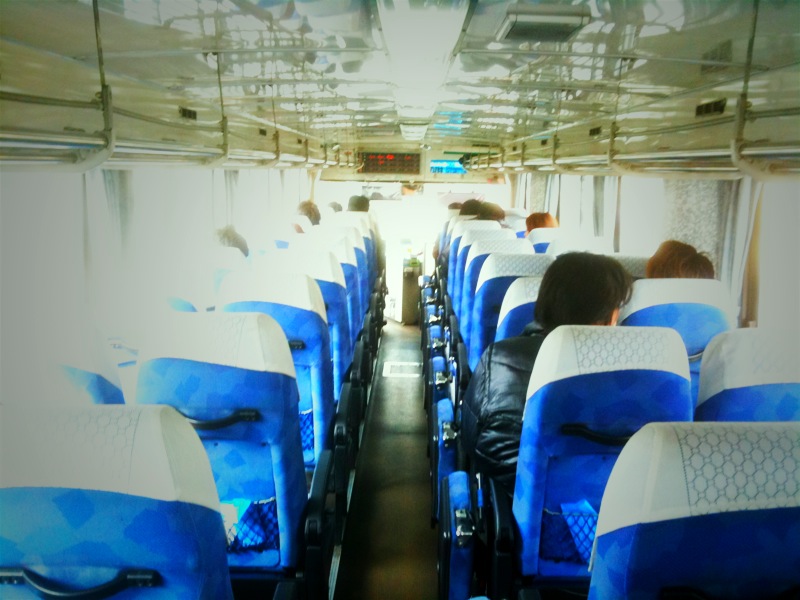Ms. Suzuki couldn’t have been more explicit about being on time. “You cannot be late,” she said at the end of last week’s interview. “Not even once.”
I had arrived twenty minutes late for it. What can I say for myself? I’m human and, well, stuff happens.
“I do not tolerate sloppiness or tardiness,” she said. “Is that understood?”
“It is.”
“Your boss told me that you were often late.”
The bastard!
I admitted that I might have been late a few times over the course of the year. But often? No, no, no. That was an exaggeration. “Did my boss inform you that he had me travelling all over Kitakyūshū in the rain, sleet, and snow? Yes, I may have been a few minutes late every now and then, but I always overcompensated by staying . . .”
“Well, I won’t tolerate you being late even a few minutes,” she said. “Is that clear, Peadar?”
“Crystal.”
“Can you promise me that you won’t be late?”
“I can,” I answered wearily.
“Then I’d like you to come again next week. And be there by nine sharp.”
“Nine o’clock sharp,” I said, writing the time down in my day planner. “I will be there. You can counton me.”
And yet here I am, and it’s two minutes of nine when the train pulls into the station. I’m one missed step from getting sacked even before I’ve been officially hired.
My intestines do a somersault as I step onto the platform. I really should head straight for the restroom, but time’s not on my side.
If only I hadn’t taken the slow train. If only I had made the connection. If only . . .
Twenty-six years old and my life is already a litany of regrets.
Climbing up out of the subway station, my gut calms somewhat, giving me a reprieve. It’s the first bit of luck I’ve had all morning and so I quicken my pace, but not too fast. Heaven forbid I jump-start my bowels into peristalsis.
A few minutes later and short-winded, I stand before the foot of the stairs that lead to my next place of employment: The American School. After catching my breath, I climb the steps and introduce myself to a dour young woman sitting behind the counter. She says that Suzuki-senseihasn’t arrived yet and, gesturing toward the next room, tells me in to take a seat and wait.
Plopping down on a shit-brown vinyl sofa in the lobby, I thank my lucky stars that I managed to get here before the president of the school.
The American School is a bit larger than the dismal little eikaiwa[1]I’ve been slaving away at for the last twelve months, but no less bleak. Like a dozen other private English schools in the city, many of which I’ve had the “pleasure” to visit for interviews before Suzuki finally called me back, there are the usual weathered stencils on the window declaring it to be an “English ConversationSchool”. There are classes for children and adults. Students, a sign states, may enroll at any time.
There are chalkboards instead of the more common white boards. In the largest of the school’s four classrooms small desks are arranged in a circle. The walls are decorated with the kinds of cheap posters you find at a teaching supply store in the States, and photos cut out of magazines. The lobby has been furnished with secondhand furniture. The sofa I’m sitting was, I imagine, once in Suzuki’s own living room.
It is, in short, an uninspiring place. If the schedule weren’t so ridiculously easy—only two or three classes a day compared to the five or six that have been teaching—I might have taken up employment at Yeehaw! English School, instead.
Being paid more to work less, that’s what this gig amounts to. As intractable as the dreariness hanging in the school’s air is, that is still a song I can dance to. Better still, I’ll have a boss who seems to know what she’s doing, rather than the moron who clutches at straws just to keep from going bankrupt every month.
Even if the expiration date of my visa weren’t bearing down on me, I tell myself, I would still leap at Suzuki’s offer.
Considering how miserable my first year in Japan has been—after twelve months I’ve emerged heart-broken, humiliated, physically and emotionally exhausted, not to mention broke—you’d think I’d be ready to return to the States like everyone else I know is. Blame it on misfiring synapses, if you like, but it is precisely because the year’s been so patently awful, that I sit here on a shit-brown vinyl sofa and think with muted optimism: Things can only get better. Things can only get better. Things can only get better.
It’s a congregation of one, of course, that I’ve been preaching to. No one else will listen. Every gaijinI know is going back to his or her home country, including my closest friend in Japan, Ben, the only person who can honestly say that he’s had a fulfilling year.
None of my expat friends mince their words. You must be a masochist to even consider staying another year, they say. Why subjugate yourself to another twelve months of what will surely be more of the same bullshit and hassles, they ask. Like a proselyte whose faith has been challenged, I defend the choice and remind them that I will not only be teaching less but will be living in Fukuoka City rather than godforsaken Kitakyūshū.
I’m not very convincing, though. How do you expect me to be when I can’t even win myself over to my way of thinking?
No, the truth behind my willingness to remain in Japan is an obstinate unwillingness to let go of the thin hope that the woman I love might find it within herself to come back to me.
Fifteen minutes pass and still no Suzuki.
So much for the importance of being punctual . . .
I’ve been feeling like crap lately, really awful. And today my chest aches from the congestion, my nose dribbles nonstop. Every time I breathe in, the fluid in my lungs rattles like a hookah. And, if that weren’t enough, my stomach has started to act up again. The coffee I had earlier seems to have gone right through me.
Just as I’m about to stand up and inquire about the restrooms, Suzuki arrives. The four-foot-eight powerhouse smiles widely and bellows out a sunny greeting, then disappears into the office. I’d love disappear myself into the restroom, but figure it is best to wait, in spite of my stomach doing flip-flops.
Suzuki gives the girl in the office a big “Ohayō” after which the two chat in hushed voices. With the restroom beckoning, I’m tempted to interrupt but then Suzuki emerges. The broad smile she was wearing when she arrived is now gone.
She directs me to a smaller classroom where we sit across from each other at an old dining room table. She looks down at the document before her, hard nails tapping at the surface of the table. The woman is fuming about something and I haven’t got the courage to ask what about. She looks up from the document, and stares at me through her steel-rimmed glasses. For a woman of such small stature, she comes off as formidable, intimidating, and downright frightening.
She inhales slowly, deeply before speaking. I inhale slowly, shallowly so as to not shock my bowels. I’ve begun to percolate and want nothing more of this world and this woman before me to be excused. Nature has stopped calling; it’s now shouting, imploring me. The way Suzuki is looking at me, however, tells me there’s nothing I can do as my insides churn but try to squeeze my butt-cheeks together.
“In our conversation last week,” she begins, “I made it veryclear that you were notto be late . . .”
“Y-yes, I know.”
“Yes, youknow . . .” She glares at me over the tops of her spectacles. “But, you were late today, weren’t you?”
Jesus Christ, that bitch in the office went and told her I was late.
“Yes, but only . . .”
Oh, Mother of God help me! My bowels have started doing the rumba.
“I have a right mind to tear this contract up and find someone else. It wouldn’t be hard, after all. There are more than enough people out there looking for work.”
And then, Suzuki actually picks up the contract and rips it in half.
What the fuck?
The shredded contract lies on the tabletop before me and Suzuki has a look on her face like I have wasted her time and, would you just leave. If it wasn’t for the fact that my visa is going to expire in less than a week and I now have no other prospect for employment, I would flip Suzuki and that other bitch in the office the bird and storm out of the building. But I need the job. Good God, do I need ever it.
As Suzuki glares at me, the realization that I’ve made a huge mistake hits me like a kick in the gut and I can’t take it anymore.
“I’m sorry,” I say standing up carefully, “but, I’m feeling very, very ill.”
I dash out of the classroom, pass the lobby and office, and hurry towards a door that has “o-tearai” (honorable hand washing) written in Chinese characters on it. Opening the door and hoping my troubles are over, I discover they’ve only just begun: the school has a fucking Japanese-style squat toilet.
Oh, for the love of God!
Taking a crap on, or should I say aboveone of these toilets is like trying to void your bowels into a shoebox.
In the floor of a slightly raised area is a narrow porcelain trough barely a hand’s length wide. I mount it and squat as well as my stiff Achilles tendons will allow me, but my arse is hovering precariously above my pants gathered at my ankles.
With the forces of nature in motion, I grab onto a large sewage pipe that runs from the ceiling down to the floor and hold on to it for dear life. I then lean back and peer down between my legs like a bombardier might until the target comes into sight. When it does, it’s bombs away!
The collateral damage is worse than expected: half of my payload lands far off target.
Good grief!
After I’ve done my business, I spend several minutes tidying the toilet up. No matter how much I wipe the porcelain down, a heavy smell of death hangs in the restroom.
I look in the small cabinet above the toilet, hoping to find a book of matches, but there is none. Next to a few rolls of the rough brown toilet paper I sanded my ass with, I find a can of what, judging by the picture of a field of flowers on it, must be air freshener.
I give the room a liberal spray, and stir up the air with my arms, but an obtrusive hint of ordure lingers stubbornly in the sweet floral fragrance, like a filthy pig lolling about a flower garden.
Several minutes later, I return to the small classroom and apologize to Suzuki. “I’m not feeling very well,” I tell her. “If today’s meeting weren’t as important as it is, I would have cancelled it and suggested meeting later in the week when I was feeling better.”
Suzuki softens somewhat. She’s still visibly irritated, however, with the foul souvenir that has trailed me back into the room, the woman cannot doubt my candor. I am clearly ill.
Just then a shriek comes from the direction of toilet. The young woman in the office has ventured into no-man’s land.
Serves her right.
Suzuki stands up and leaves me alone in the classroom (Could you blame the woman?) and returns a few minutes later with another contract, which she places on the table before me. She asks that I read through it.
As I go through the contract, my jaw drops onto the tabletop. Each item in the contract is written in the bluntest of terminology—namely, do this and you’ll be fired; do that and you’ll be fired. There is no room for mistakes at The American School.
If I am ever late—regardless of illness, accident, ill-timed bowel movements, or what have you—my employment will be terminated on the spot.
I swallow hard and sign the contract. What else do you expect me to do?
Once all the paperwork is complete, Suzuki instructs me to meet her at Immigration next week, the day before my visa expires.
“If you are even a minute late,” she warns, “I will have no choice but to look for someone else. Am I understood?”
“Y-yes, you are.”
“Well, then. See you next week.”[2]
I would end up staying with “The American School” for four years. I was never late or absent during my entire time there. The same could not be said of Suzuki-sensei.
























